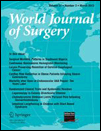Endoscopic versus Open Radiofrequency Ablation for Treatment of Small Hepatocellular Carcinoma
Abstract
Background
Surgical radiofrequency ablation (RFA) for hepatocellular carcinoma (HCC) is associated with superior oncological outcome in comparison with percutaneous RFA. The present study aimed to retrospectively evaluate the relative perioperative safety and postoperative outcome of the laparoscopic or thoracoscopic approach versus the open approach to RFA for small HCC.
Methods
A retrospective analysis was performed in 55 consecutive patients who underwent open (n = 32) or laparoscopic/thoracoscopic (LTS) RFA (n = 23) for primary unresectable HCC between January 2005 and December 2010. Baseline characteristics, survival/recurrence rates, and complications after treatment were compared between the two groups.
Results
There was a trend showing that LTS RFA was performed for tumors located in the anterior segment (e.g., segments III, V, VIII). The LTS RFA group had a significantly lower intraoperative blood loss, shorter operative time, and shorter postoperative hospital stay, compared with the open RFA group. No major postoperative complications occurred in patients who underwent LTS RFA. No significant differences in overall survival, recurrence-free survival and local recurrence rates were observed between the two groups.
Conclusions
In consideration of operative invasiveness and postoperative recovery, LTS RFA is superior to the open approach in patients with small HCC. Moreover, the surgical outcome did not differ between the two approaches. Laparoscopic/thorascopic RFA can be considered to be a useful procedure for ablation therapy.




